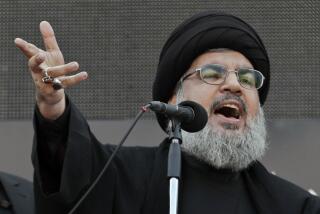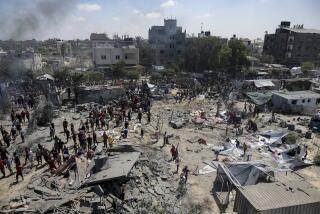Amid Internal Strife, Arafat Decries Slaying of Advisor
JERUSALEM — Palestinian Authority President Yasser Arafat on Tuesday denounced as a “dirty assassination” the execution-style killing of a longtime advisor by gunmen in the Gaza Strip, which appeared to be a sign of intensifying internal conflict among the Palestinians.
At the same time, Israeli authorities revealed that there was a sharp increase in home building in Jewish settlements. The construction could complicate Israeli efforts to secure U.S. approval for a plan under which Prime Minister Ariel Sharon’s government would uproot settlements in the Gaza Strip but consolidate control over large settlement blocs in the West Bank.
The death of Khalil Zaben, a 59-year-old Arafat loyalist who also worked as a journalist, was shocking even by the standards of increasingly brazen street violence in Gaza and parts of the West Bank. He was riddled with more than a dozen bullets as he left his Gaza City office after midnight.
No group immediately claimed responsibility, but Palestinian sources and Israeli authorities said the killing almost certainly stemmed from the complex Palestinian factional power struggles that have been playing out in recent months in Gaza and the West Bank.
In the course of the violent, 41-month-long conflict with Israel, whatever centralized authority existed in the Palestinian territories has been breaking down at an accelerating pace.
Armed Palestinian factions, some with allegiance to Arafat, some backing his rivals within the Palestinian Authority and some affiliated with one of the plethora of militant groups, have engaged in a growing display of muscle-flexing in recent months -- often directed not at Israel, but at one another.
Despite Arafat’s denunciation of the killing, his security forces said there were no suspects -- even though Gaza is so small and insular that suspicions of carrying out any notable act of violence generally fall quickly on one group or another.
Several of the main militant groups denied a role but took the opportunity to criticize Arafat. The Popular Front for the Liberation of Palestine, one of the smaller organizations, blamed his administration for allowing a climate of turmoil to take hold in Gaza.
Hamas, the largest and most powerful of the militant groups, issued a statement denying responsibility for Zaben’s death, then a subsequent one saying the initial denial had not been authorized, but that Hamas did not regret the death.
At his half-ruined headquarters in the West Bank city of Ramallah, Arafat convened his Cabinet and National Security Council to discuss the deterioration of public order in Gaza. Afterward, top Palestinian officials expressed worry that internal feuds could derail efforts to restart peace talks.
“I believe the Palestinian government and security forces must take all action possible to end this chaos -- it is really undermining the Palestinian struggle to establish an independent state,” Cabinet Minister Saeb Erekat said.
Many Palestinians blame Israel for the slide into lawlessness because it has targeted their security forces at various points in the intifada, or uprising against Israeli occupation. Israel has accused some members of the Palestinian police and other security branches of deep involvement in terrorist attacks.
Israeli officials have been disquieted by Palestinian- on-Palestinian violence, because an eruption of all-out factional fighting would greatly hinder negotiations with the government led by Palestinian Authority Prime Minister Ahmed Korei.
“Fatah members from the West Bank and Gaza I meet say there’s total chaos in the territories -- internal fights, the rule of gangs,” said Menachem Klein, an analyst at Bar Ilan University. “Arafat shows occasional spurts of control, but they are limited and temporary.”
In the longer term, both Israeli and Palestinian officials worry that Palestinian militant groups will move to the forefront if Israel pulls its soldiers and Jewish settlers from Gaza, as Sharon has said he wants to do.
Nonetheless, Israel pressed ahead with diplomatic efforts to win support for Sharon’s initiative for a unilateral pullout. Foreign Minister Silvan Shalom met Tuesday in London with British officials, and a senior Israeli delegation was in Washington laying the groundwork for a White House invitation for Sharon.
The plea comes at an awkward moment. The Bush administration has long demanded that Israel stop expanding Jewish settlements, but statistics released Tuesday indicated that settlements are growing rapidly.
Israel’s Central Bureau of Statistics said housing construction in the West Bank and Gaza had increased by more than one-third in 2003 over the previous year.
More to Read
Sign up for Essential California
The most important California stories and recommendations in your inbox every morning.
You may occasionally receive promotional content from the Los Angeles Times.









